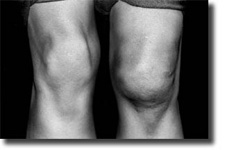Swollen Knee

Tips for Swollen Knee Care
Chances are that sometime in your life you are going to wake up in the morning with a swollen knee. That’s because a swollen knee is one of the most common medical problems in the world. You may quickly remember what you did to cause your knee to be swollen, or it may be a mystery and you will never know.
It doesn’t take much to tweak a knee. In fact, you may have done nothing at all other than age. One of the symptoms of arthritis is a swollen joint and that could well be the case with your knee. If you are young, it is more apt to be some type of acute injury, such as a collision of some kind, whether it be in an auto accident or playing football or other sports.
The first thing you need to figure out is what caused the swollen knee, and whether it is serious enough to warrant a visit to your doctor or the emergency room at the hospital. If you are sure that you injured your knee, you could try the rest, ice, compress, elevate treatment for a day or two. If the swelling and/or pain is not relieved in that period of time, you need to get medical assistance. You should consult your medical practitioner and if you don’t have one, make a trip to the emergency at the nearest hospital.
The knee is a complex joint that needs everything to be working in sync for it to do its job. If you have a swollen knee, it means that there is an accumulation of fluid either in the tissue around the joint or in the joint space itself. There is a capsule that surrounds the knee, which has fluid used to keep the joint operating effectively, kind of like lubricating an engine. This fluid can get built up to the point where it can cause the knee to swell.
Another possibility you have to consider if you know an injury is involved, is that the fluid causing the swollen knee might be blood. The two most probable conditions that would cause a large amount of bleeding in the knee are a fracture of the bone (or cartilage) in the knee or an ACL (anterior cruciate ligament) tear. Today, the most common injury among skiers is not a broken leg—it’s an ACL tear. If an ACL is the problem, you will need to see an orthopedic specialist.
If the liquid in your swollen knee is not blood but a build-up of fluid, your problem may be a meniscus tear or a sprained ligament. If this is the case, you might need a surgical treatment option. Arthritis can cause a swelling of the knee. This becomes a chronic condition and how often it happens depends on the extent to which you use the knee.
Rapid onset swelling without an injury is the final choice for the cause of your swollen knee. The two most popular choices in this category are gout and infection. Gout occurs when a large amount of uric acid crystals collect in the joint space. These are a byproduct of the human digestive process. This can be controlled by medication.
Infection can cause fluid to build up in the knee. It doesn’t even have to be an infection of the knee. Infections in other parts of the body can travel through your blood to the knee. Depending on the extent and type of infection, you might just need antibiotics or you might even need surgery to remove the infected tissue.
If the cause of your swollen knee still hasn’t been discovered, it might be from fluid on the outside of the joint instead of inside the joint. If this is the case, you will be able to feel fluid on the top of your kneecap. The most common cause for this condition is prepatellar bursitis.
As you can see, there are many different causes of a swollen knee, and some of them can be serious, requiring surgery and/or medications. Never just assume that swelling in the knee is nothing and it will just go away. See a medical professional and get diagnosis and treatment of the problem.